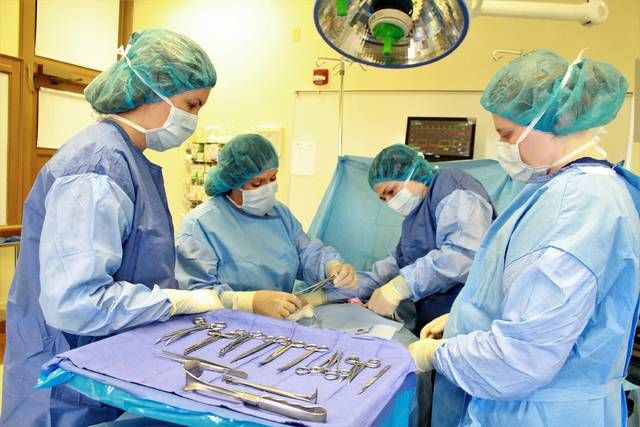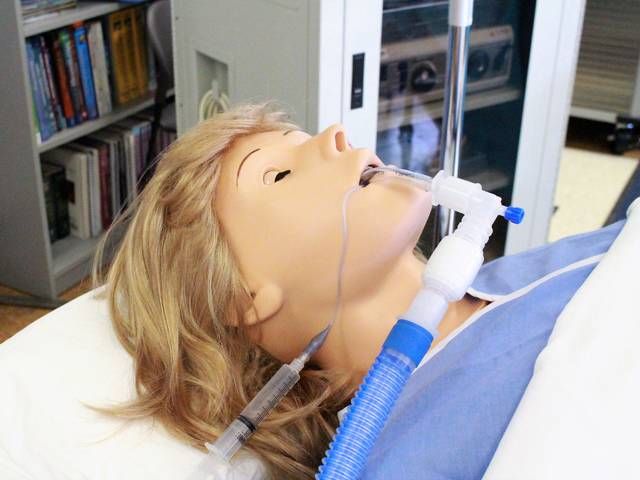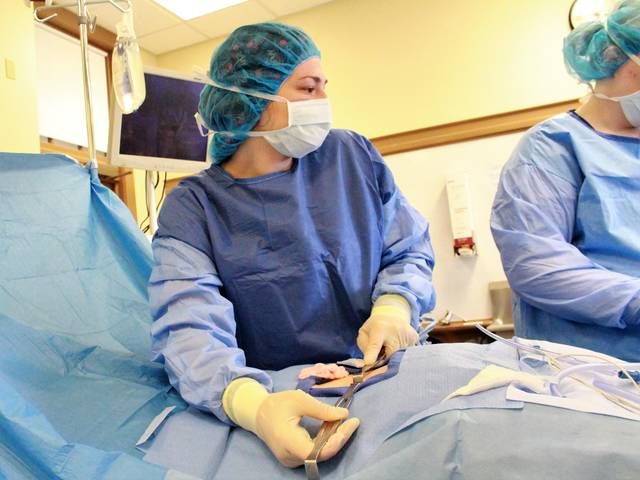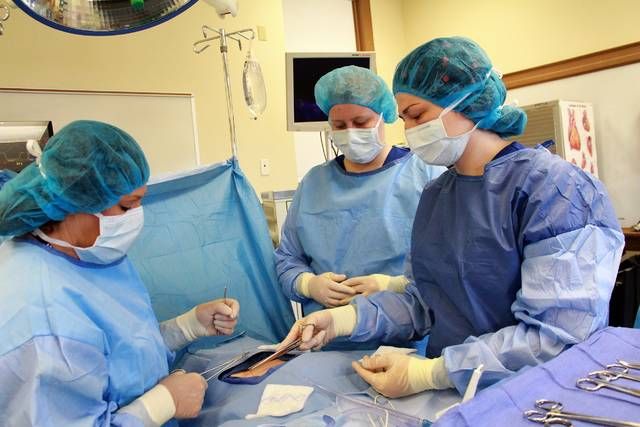
Students in the surgical technology program at Lackawanna College in Scranton are using an array of surgical tools as they work on a simulated human body called Surgical Chloe. The monitor on the wall shows such vital signs as heart rate and blood pressure to reflect different medical scenarios.
Lackawanna College Photo
Surgical Chloe recent addition to Lackawanna College program
Click here to subscribe today or Login.
Chloe was in trouble.
She’d just had surgery for an inguinal hernia, and it appeared she was having a reaction to a local anesthetic.
A glance at the monitor above her bed revealed her blood pressure was dipping dangerously low — 87/48, followed by 77/36 and 68/24.
Then — oh, no — the monitor revealed 00/00, a flat line.
But Joel Helcoski didn’t give up. The young man from Scranton continued to apply CPR, gently but firmly pressing down on Chloe’s chest again and again as his colleagues counted each compression.
“Do you need a break?” Amanda Hickman from East Stroudsburg said, slipping her hands onto Chloe’s chest and maintaining the rhythm.
Gradually, Chloe’s blood pressure returned, all the way to a healthy 120/80,.
“They brought her back,” said Blaze Nolan from Athens. “We’re good.”
Bystanders sighed with relief, and several admitted their own hearts had been racing as they watched the life-or-death situation unfold — though it wasn’t really life or death.
Surgical Chloe isn’t a human being but an exciting addition to the surgical technology program at Lackawanna College in Scranton.
“She’s capable of bleeding and breathing — you can hear it and you can see it,” program director Mary Lou Dotzel said, pointing to Surgical Chloe’s chest as it rose and fell.
“We can intubate her. We can perform laproscopic surgery on her,” Dotzel said, naming a few of the simulator’s features.
Programs that come with the simulator call for students to handle problems ranging from a ruptured ectopic pregnancy to anaphylaxis (a severe allergic reaction) to fire in the operating room.
“What I like about it is, I can change the program,” Dotzel said, explaining that feature provides for an even greater variety of scenarios
Dotzel’s students use real surgical equipment such as scalpels and retractors on Surgical Chloe, and can suture her with real stitches. Before Surgical Chloe flat-lined during class on a recent Wednesday afternoon, they practiced handling the instruments during the hernia surgery. As Dotzel advised them, it sometimes became evident that a slight adjustment in the angle of a hand could make a procedure more efficient.
“Using a surgical simulator will make them that much better prepared for the ‘real world’ and that will lead to better patient outcomes, Dotzel said, adding that recent graduates of the surgical technology department have found work in Ithaca, Sayre and Allentown as well as locally with Tyler Memorial Hospital and Community Medical Center.
“We have a 100 percent CST (Certified Surgical Technologist) exam pass rate and 100 percent placement,” Dotzel said.
Health care facilities have contacted her to ask for more graduates, Dotzel said.
“Sometimes people think the only health care professionals in an operating room are doctors and nurses, but surgical technologists are part of the team,” Dotzel said, explaining the program prepares its graduates to be responsible for supplies and equipment in an operating room and to assist a surgeon by retracting, sponging and suctioning during surgery.
“More people should know about this career opportunity,” she said.
For more info, see lackawanna.edu or contact Mary Lou Dotzel at 570-955-1457.







